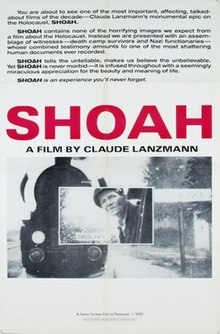Shoah (film)
| Shoah | |
|---|---|

US theatrical release poster
|
|
| Directed by | Claude Lanzmann |
| Starring |
|
| Cinematography |
|
| Edited by |
|
|
Production
company |
|
| Distributed by | New Yorker Films |
|
Release date
|
|
|
Running time
|
|
| Country |
|
| Language |
|
| Box office | $20,175 |
Shoah is a 1985 Franco-British documentary film, directed by Claude Lanzmann, about the Holocaust (called the "Shoah" in Hebrew and French). The film primarily consists of his interviews and visits to German Holocaust sites across Poland, including three extermination camps. It presents testimonies by selected survivors, witnesses, and German perpetrators, often secretly recorded using hidden cameras.
As Lanzmann does not speak Polish, Hebrew, or Yiddish, he depended on interpreters to work with most of his interviewees. This process enlarged the scale of the documentary, which is nine hours and 23 minutes long. Lanzmann has also released four feature-length films based on unused material shot for Shoah.
While Shoah received critical acclaim and won notable awards, the film also aroused controversy and criticism, particularly in Poland, but also in the United States. A number of historians criticized it for failing to show and discuss the many Poles who rescued Jews, or to recognize the millions of Poles who were also killed by the Germans during the occupation of Poland.
Shoah was ranked number two on the "50 Greatest Documentaries of All Time" in a December 2015 poll by the British Film Institute.
The film is concerned chiefly with four topics: Chełmno extermination camp, where mobile gas vans were first used by Germans to exterminate Jews; the death camps of Treblinka and Auschwitz-Birkenau; and the Warsaw Ghetto, with testimonies from survivors, witnesses, and perpetrators.
...
Wikipedia
